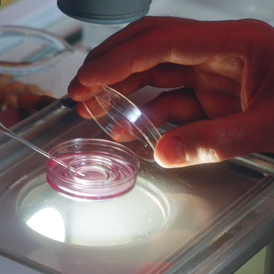MPs criticise IVF ‘postcode lottery’
More than 70 per cent of NHS trusts are ignoring guidance to offer infertile couples three chances at IVF and some have stopped funding the pregnancy treatment altogether, a damning report claims.

A cross-party group of MPs found IVF treatment on the NHS has become a postcode lottery as many primary care trusts (PCTs) place strict restrictions on who is eligible for care.
Most PCTs have put limits on the age at which they will treat women – with Bury PCT only allowing women to be treated between the ages of 39 and 40, meaning younger women can wait years despite the fact that fertility declines with age.
In Hampshire and Milton Keynes, women are only eligible for treatment between the ages of 30 and 34 while only those aged 30 to 35 will be offered IVF in Bournemouth and Buckinghamshire.
Five PCTs – Warrington, West Sussex, Stockport, North Yorkshire and York, and North Staffordshire – offer no IVF at all.
In Wales, many health trusts only allow women IVF between the ages of 38.5 and 40.
According to guidance set by the National Institute for Health and Clinical Excellence (NICE) in 2004, couples should be given up to three cycles of IVF on the NHS, where the woman is aged 23 to 39.
But despite repeated Government reminders on the issue, the guidelines have never been fully implemented across the NHS.
Strict criteria revealed
A new report from the All Party Parliamentary Group (APPG) on Infertility shows 73 per cent of NHS trusts are failing to follow the guidance.
Freedom of Information requests for 152 PCTs found many had strict criteria on age as well as weight, smoking status of the couple and restrictions on IVF if one partner already had a child, regardless of whether they had contact with them.
PCTs had no rules on alcohol and caffeine consumption – factors known to play a role in fertility.
The report said the criteria revealed that the NICE guidelines had been “taken out of context by PCTs and used to place arbitrary restrictions on the provision of IVF”.
Gareth Johnson, Conservative MP for Dartford and chairman of the APPG on Infertility, said: “One in seven couples in the UK suffer from infertility problems, indeed more women attend GP surgeries to obtain advice on infertility than any other issue other than pregnancy.
“This shows just how big an issue infertility is for so many people.”
NICE is currently reviewing its guidance and will publish a report in 2012.
In a foreword to today’s report, Health Minister Anne Milton, said she was “aware that a small number of PCTs with historical funding problems have temporarily suspended provision of IVF services”, adding that she would encourage all PCTs to “have regard” to the current NICE guidance.
The Freedom of Information figures were gathered in March from health trusts across the UK.
A spokesman for North Yorkshire and York PCT said the trust would not fund any IVF in the coming year, while North Staffordshire PCT and Stockport said IVF was not funded. A spokeswoman for Warrington PCT said the decision not to provide IVF would be looked at again in July.
A spokeswoman at NHS West Sussex said it had reinstated IVF treatment for all eligible cases after suspended it during the last financial year.
-
Latest news
-
Yungblud launches his own affordable music festival5m

-
Why these Americans want to quit their state9m

-
Company behind infected water outbreak are ‘incompetent’ says local MP5m

-
Israeli forces push deeper into Northern and Southern Gaza4m

-
India’s ‘YouTube election’: Influencers enlisted to mobilise youth vote6m

-




